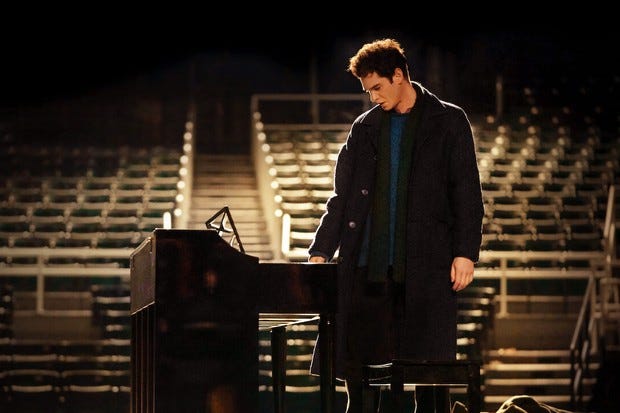There comes a time in every theatre kid’s life where they learn all the words to La Vie Boheme. It hits a perfectly angsty and hedonistic cortex of the growing teenage brain; sexuality, drugs, alcohol, a revelry in being free when you aren’t totally in control. But then I observed that growing older, the superiority complexes abounded and Rent was no longer cool. Brains grow to cringe at what they once loved! Everyone’s “unpopular opinion” about Rent develops into critiques shared by most young adults: The plot is messy, the lyrics are sometimes nonsensical, it focuses too much on the white, heterosexual characters. But I think the triumph of Rent is that it changed musical theater convention for good in spite of its issues. The more I learn about Jonathan Larson, the more I love Rent for what it is, and I hope that Tick, Tick…Boom can rehabilitate that reputation from being teenage-cringe into a more nuanced appreciation.
First, let me get one thing straight: if you are genuinely asking why they didn’t pay rent, you have sold out. It’s anarchy, it’s anti-capitalism, it’s revolution, get with it. It’s a political ideal that makes sense if you look at what Larson’s life was like, and how it’s portrayed in Tick, Tick…Boom. Jonathan laments the possibility that he might have to give up his artistic dreams, as his friends have, for financial stability. Turning 30, he hears everyone telling him it’s time to grow up and wonders if the end of his youth is the end of his career. He wonders why he has to choose.
The show was originally a one-man-show Jonathan put on called “Boho Days.” After his death, it was adapted to a three-person play. It crackles with poignancy; the character of Johnny senses himself on the precipice of creating greatness, but the audience knows what happens next. Rent succeeds, but he doesn’t get to see it. It’s simultaneously reassuring and heartbreaking to watch.
Larson died of an aortic aneurysm the day before the off-Broadway previews of Rent. Some say this put the show in headlines, drawing attention to this little underdog and ensuring its success. Regardless, it had an impact on what the show could be. Most theatre productions go through a lot of changes before Broadway, especially before an opening. Rent didn’t have this privilege. It did go through some changes by the rest of the team, but protecting Larson’s legacy and work was suddenly the biggest factor. The whole of Rent we see is frozen in time, raw, unedited. So while a more cynical person may say Rent achieved its fame because of the surrounding tragedy, I unequivocally believe this hindered it.
And Yet! Rent changed popular musical theatre permanently, in spite of its flaws. The whole genre! It is singlehandedly taught my generation about the AIDS crisis. It portrayed the life of poor, queer New Yorkers in a way that resonated with enough people to make it a sensation. We could imagine what it could have been if Larson had been able to work with it all the way til the end, or we can marvel at what it became anyway. I’m grateful for that.
Andrew Garfield, who is playing Jonathan in the new film directed by Lin-Manuel Miranda said this anecdote in a recent interview, which I believe demonstrates the prescience of Tick, Tick…Boom:
”There was a line in the original one-man show “Boho Days”: “Sometimes, I feel like my heart is going to explode.” It was too on-the-nose for people after he passed away, and they had to cut it.”
Larson had other works, too. The Jonathan Larson Project uncovered songs he wrote for various theater benefits, and shows that never manifested, such as Suburbia (the play he’s working on in TTB). This album creates a fuller picture of what he wanted to do with his art and his life, and it supports the image of someone who wanted to make a difference. I don’t want to say he was ahead of his time, but with songs like White Male World, The Truth is a Lie, it’s hard not to feel like he was writing for us, today.
Tick, Tick…Boom provides context for a life, but also a snapshot in time that isn’t particularly prevalent in media. I hope this re-evaluation of Larson’s life allows a more understanding lens to his work, especially in a political climate turning towards revolution.



